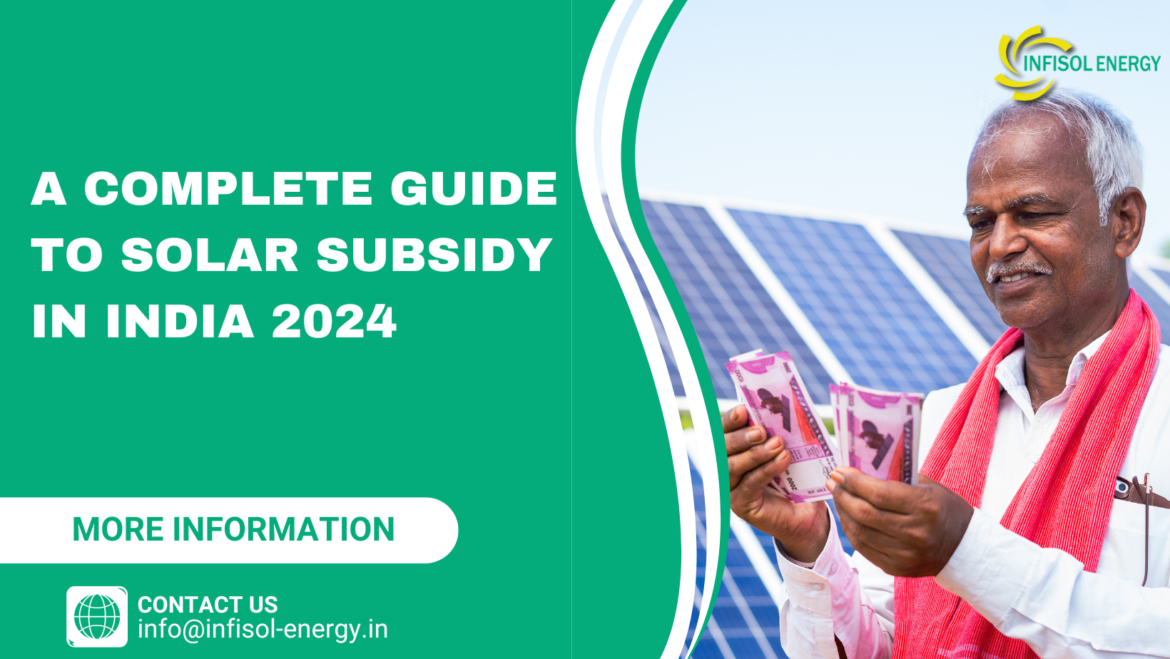To cut energy costs and limit pollution, switching to solar is an intelligent alternative. Nevertheless, it is a green and cost-effective option for lighting up homes and industries since it uses sunlight to create electricity using solar photovoltaic (PV) technology. In India, the government offers solar subsidy towards the cost of solar installation for home to make this transition more affordable.
Thus we can take advantage of the country’s solar panel subsidy schemes provided by the government. If you want to know about Solar Panel Subsidies in India 2024 here is a guide that covers everything in easy-to-understand terms.
What is Solar Panel Subsidy?
The government offers a financial grant called “Solar Panel Subsidy,” which assists in footing part of the bill for installing PV systems. These subsidies are available for residential, commercial, and industrial solar power systems, but the focus here will be on residential installations.
Solar Panel System Subsidy in Maharashtra
The Indian government offers rooftop solar subsidies to individual homeowners and housing societies in Maharashtra and across India. This has resulted in numerous installations; many households can now use inexpensive, environmentally friendly electricity generation on their premises. This could also be your chance to plug into free green power from the sun.
Under the Rooftop Solar Programme Phase II scheme, the government offers specific subsidies depending on installed capacity. For example, rooftop solar systems with a capacity of up to 1 kW receive ₹130,000, 3 kW receive ₹78,000 per kW subsidy while those with capacities above 3 kW and up to 10 kW receive ₹78,000 per kW in subsidy amounts.
Note that whereas the first 3 KWs will still be paid ₹78,000 as subsidy per KW yet, beyond additional capacity.
The other category occurs when one installs above 10 KW panels; a flat rate of Rs78,000 would be given out. That way, large-sized units are supported, although there are no further increases for greater size past this point.
In addition, communities like Resident Welfare Associations (RWA) and Housing Societies (GHS) get subsidized at Rs 18000/KW for shared facilities. The maximum installation size is 500 kWp with an upper limit of 10 kWp per dwelling.
How Much Does Solar Panel Cost in Maharashtra?
The total expenditure on solar panel systems in Maharashtra will vary depending on their size as well as whether they are monocrystalline or likewise polycrystalline or thin film.
- 1kW Solar System: ₹80,000 – ₹90,000
- 2kW Solar System: ₹1,40,000 – ₹1,50,000
- 3kW Solar Panel: ₹1,90,000 – ₹2,00,000
- 5kW Solar System: ₹3,00,000 – ₹3,10,000
- 10kW Solar System: ₹5,50,000 – ₹5,60,000
With subsidies, these costs can be significantly reduced, making solar more accessible. GST of 13.8% is not included in this!
How to Apply for Solar Panel Subsidy
In India, applying for a solar subsidy is simple and straightforward. This is how you should go about it:
Step 1: Registration
Create a new user account by going to National Portal for Rooftop Solar.
Step 2: Apply for Subsidy
Fill out the registration form online and click submit.
Step 3: Technical Feasibility Approval (TFA)
Your local DISCOM will check your application to determine if it can be accommodated into the grid.
Step 4: Vendor Selection
From among the registered vendors listed by DISCOM. Choose Infisol Energy LLP as a vendor to install solar for your home in Maharashtra.
Step 5: Installation
Finally, proceed with installing your solar system by the selected vendor.
Step 6: Submit Documents
Upload necessary documents including pictures of installed systems.
Step 7: Inspection
An official shall come and inspect your system at home in order to ascertain that everything meets the required standards.
Step 8 Subsidy Disbursement
If approved, the subsidy amount will be deposited into your bank account.
Net Metering: An Added Advantage
This enables owners of PV installations to earn credits against electricity that they feed into the grid through their power purchase agreement which they own. If there’s more generation from your sun-powered rooftop than you use, an extra roof-top power goes back into the utility’s main grid, resulting in bill ‘credits’ for residents. This ensures that energy compensation occurs, thus doubling the financial benefits that emerge from solar power adoption.
How to Apply for Net Metering in Maharashtra
- Submission of Application: Go to Mahadiscom website and send your application.
- Fill-in Required Information: Complete the required information on the form.
- Payment of Registration Fees: The fees are not refundable.
- Review by Empanelled Agency: Your application will be reviewed by an approved agency and a field officer of MSEDCL.
- Installation and Inspection: This is done only after the net-metering system is approved.
Conclusion
Conversion into solar energy is an intelligent economic choice and a big leap towards sustainability. With the vast incentive programs from the Indian government, this had never been much cheaper. These subsidies make it easier for individual homeowners and housing societies to invest in solar power, reducing their energy bills and carbon footprint.
We at Infisol Energy LLP promise to guide you through this process so that you take full advantage. In Maharashtra, our solar company has been acknowledged for its excellent services including specialized advice, tailor-made solar solutions and seamless installations.
Our aim is to help you save on energy costs while playing your part in protecting the environment. Call us today for a free consultation and start paving way to a brighter, more sustainable future with solar power.
FAQs
Is there any warranty on the solar system if we register on a subsidy scheme?
Yes, solar installation companies will offer a performance warranty of 5 years. After this duration customers will be responsible for any maintenance and repairs required.
Are there commercial and industrial solar plant subsidies available?
The subsidy scheme is primarily meant for residential buildings. However, there are some benefits that can accrue to commercial and industrial solar energy systems like tax holidays or accelerated depreciation exemptions.
Does the same apply to all states regarding the prices of these solar subsidies?
These vary within different states despite the fact that central government subsidy rates in India are standard.




